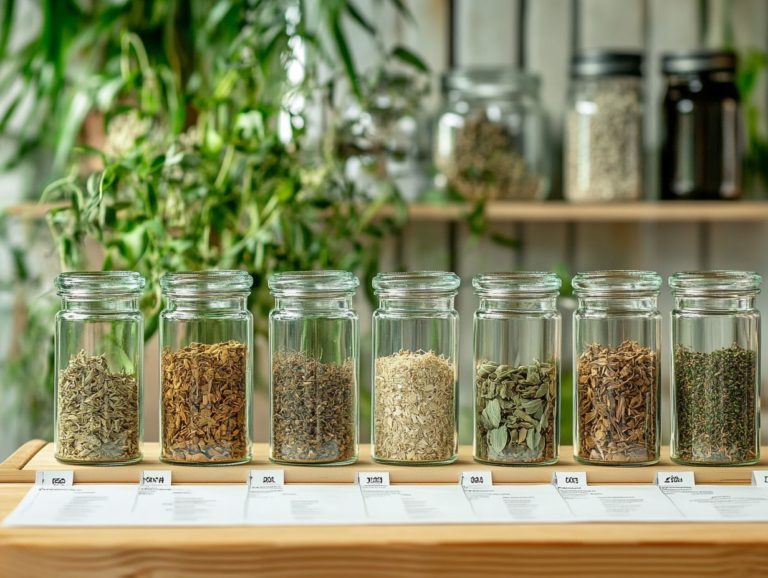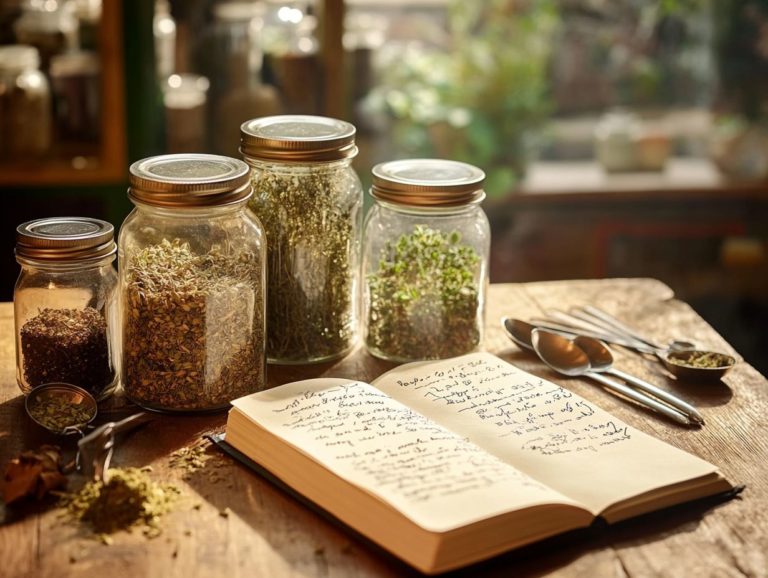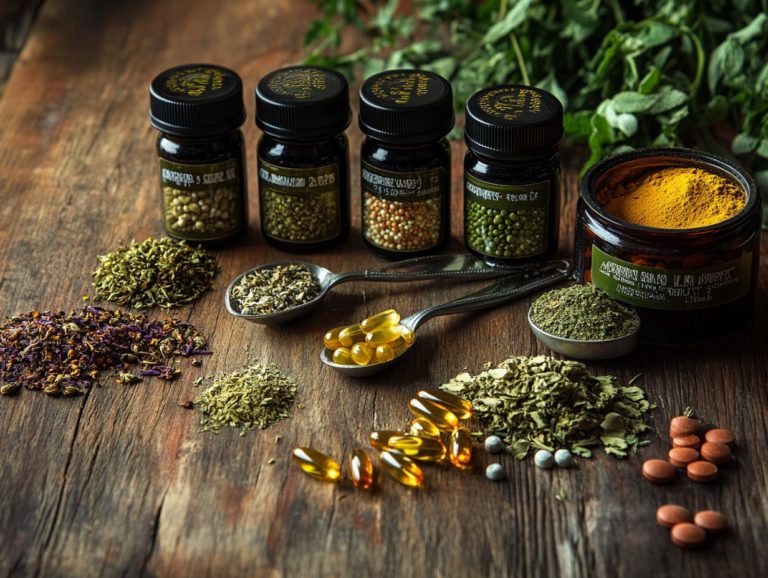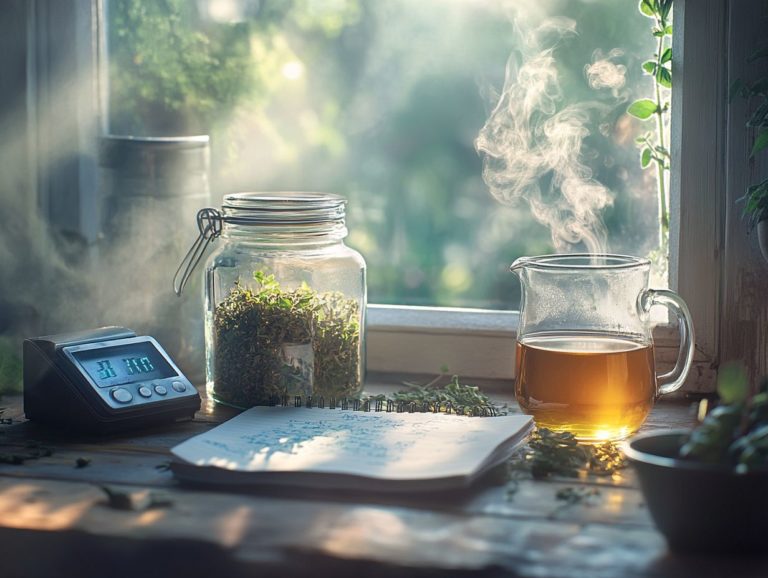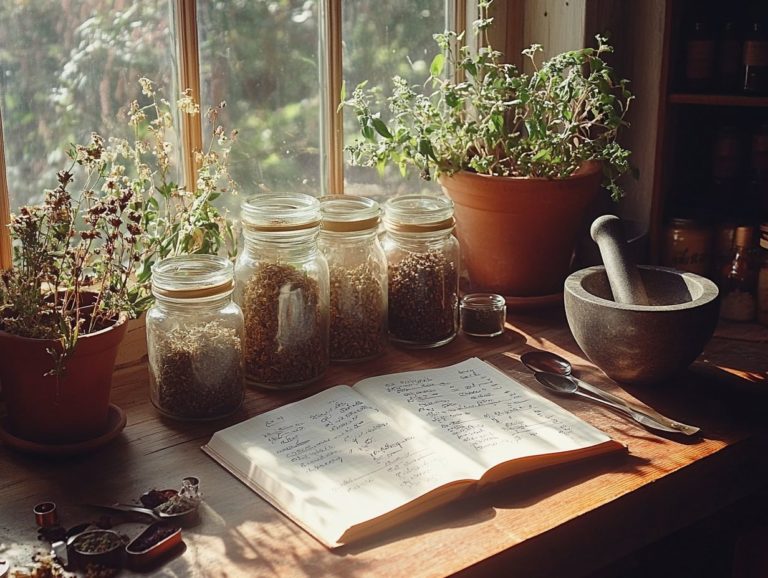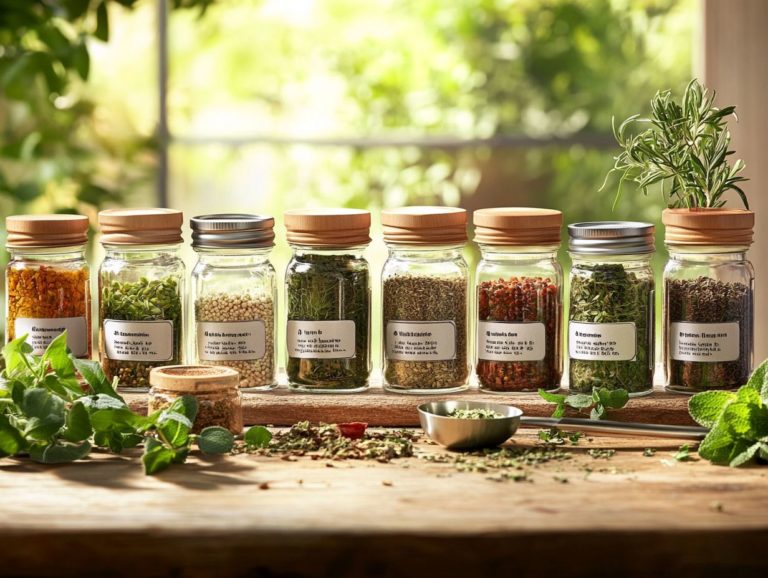Herbal Dosing: Best Practices for Efficacy
Herbal dosing plays a pivotal role in unlocking the full benefits of natural remedies.
Grasping what herbal dosing involves can greatly enhance your experience with herbal remedies. Factors such as body weight, condition severity, and herb quality are essential considerations.
This article delves into best practices for dosing, highlights common pitfalls to avoid, and underscores the importance of consulting with healthcare providers for a tailored approach.
By exploring these essential aspects, you can ensure a safe and effective journey into the world of herbal remedies and plant-based products.
Contents
- Key Takeaways:
- Understanding Herbal Dosing
- Factors Affecting Herbal Dosing
- Best Practices for Effective Dosing
- Common Mistakes to Avoid
- Frequently Asked Questions
- What is herbal dosing and why is it important for efficacy?
- How can you dose herbs safely and effectively?
- Can herbal dosing vary based on individual factors?
- Is there a maximum recommended dose for herbal remedies?
- How should herbal dosing be adjusted for children and elderly individuals?
- Is there a risk of overdose with herbal remedies?
Key Takeaways:
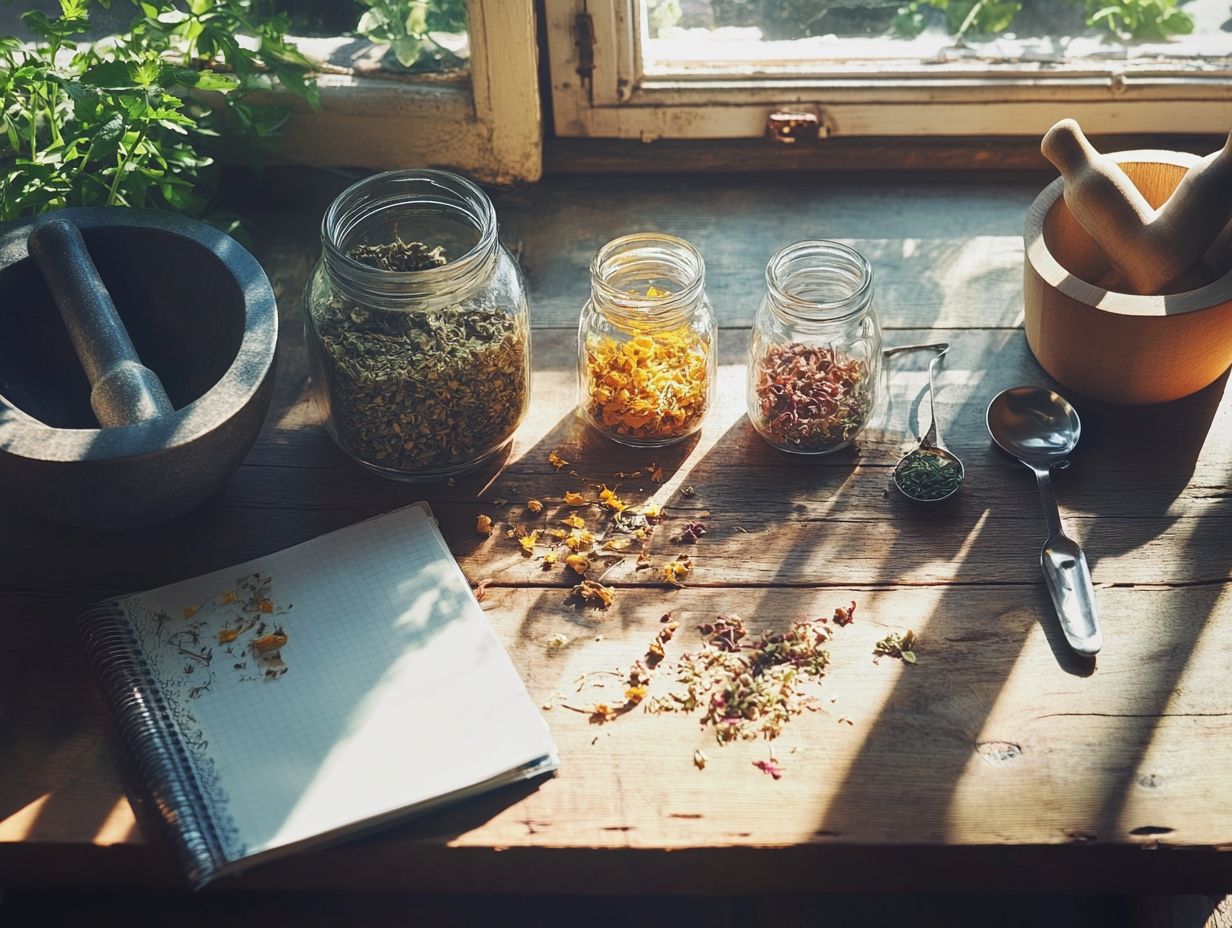
- Consult with a healthcare provider to determine the appropriate herbal dose based on factors like body weight, condition severity, and herb quality.
- Properly measure and administer herbs to avoid common mistakes like overdosing, underdosing, and interactions with medications.
- Avoid a trial-and-error approach and adjust for individual factors to ensure the best efficacy with herbal dosing.
Understanding Herbal Dosing
Understanding herbal dosing is crucial. It helps you harness the benefits of herbal medicine and safely integrate these products into your health routine.
Proper dosing can greatly influence the effectiveness of treatments for various health conditions. It s essential to consider standardized dosages and quality control when selecting herbal products.
Understanding the historical significance of medicinal plants offers valuable insights into effective phytotherapy approaches, or plant therapy.
What is Herbal Dosing?
Herbal dosing is all about the precise measurement and administration of herbal products. This helps you achieve the desired therapeutic benefits while keeping risks at bay.
This practice is essential in herbal medicine. It ensures you receive just the right amount needed for efficacy without compromising your safety.
Accurate dosing guidelines empower practitioners to tailor treatments specifically to your health conditions, body weight, and sensitivity to particular herbs. Understanding the risks of improper herbal dosage is crucial to ensure safety and effectiveness.
When done effectively, herbal dosing can enhance the bioavailability the amount of active compounds your body can use of these remedies. By following established dosing protocols, you can unlock the potential therapeutic benefits of herbal remedies.
These include improved digestion, reduced inflammation, and enhanced mental clarity, all while avoiding safety concerns associated with overconsumption or misuse.
Factors Affecting Herbal Dosing
Several key factors greatly affect herbal dosing for you. These include your body weight, the severity of your health condition, and the quality of the herbs utilized in your preparations.
Body Weight and Composition
Your body weight and composition play a vital role in determining the optimal herbal dosing for effective phytotherapy. Each individual metabolizes herbal compounds differently, influenced not just by weight but also by muscle mass and fat distribution.
There is a growing acknowledgment of the necessity for personalized dosing practices tailored to your unique physiological characteristics. As your body composition shifts, so too do the absorption rates and bioavailability of the active constituents in herbs.
Consequently, your therapeutic outcomes can significantly improve when dosages consider your specific body parameters, leading to a more effective and safer experience with herbal remedies.
Unlock the full potential of herbal remedies today! With the right doses, you can experience amazing benefits. Don t miss out on the chance to improve your health!
Severity of Condition
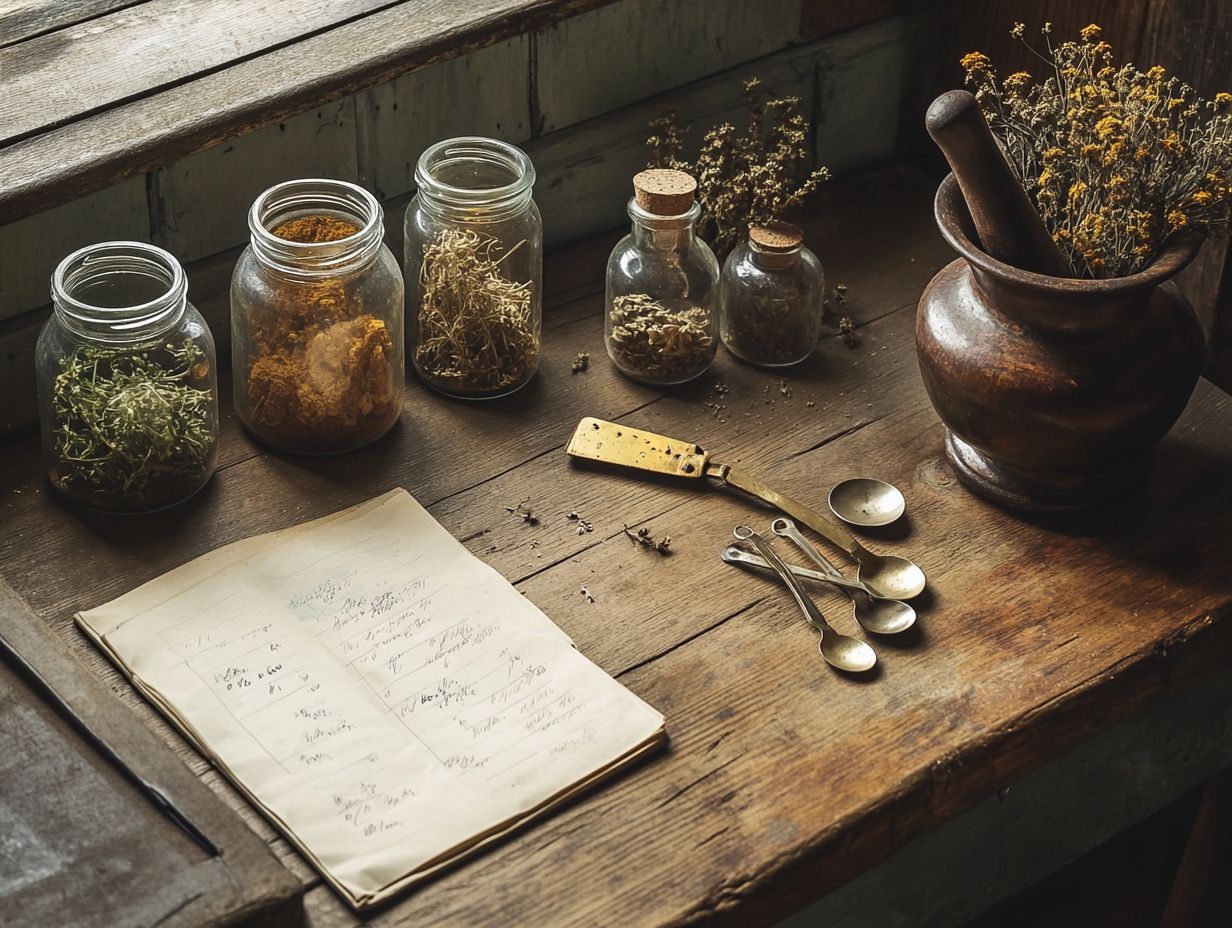
The severity of your health condition is crucial in determining the appropriate dosage of herbal remedies and supplements.
When you experience varying levels of symptoms or complications, your response to treatment can differ significantly.
If you have a mild ailment, a lower quantity of herbal supplements might yield noticeable effects. In contrast, someone with a severe version of the same condition may require a higher dosage for optimal results.
Personalized care is key! Tailoring dosages based on your health makes treatments work better.
Adjusting dosages enhances the efficacy of the treatment and minimizes the risk of adverse reactions. Healthcare professionals must consider these factors meticulously, tailoring their recommendations to fit your unique health profile.
Quality of Herbs
The quality of herbs you choose for herbal preparations is fundamental to their efficacy and safety.
When the composition of herbs is compromised through poor harvesting methods, contamination, or improper storage it directly impacts their therapeutic properties.
This inconsistency leads to inaccurate dosing and reduced health benefits. You deserve to trust what you consume. Always choose quality herbs for your health!
Implementing stringent quality control practices ensures products meet expected standards, fostering a credible relationship between suppliers and users, vital for consumer trust.
Best Practices for Effective Dosing
Implementing best practices for effective dosing requires you to consult with a healthcare provider and meticulously measure herbal formulations.
Measure carefully to get the most out of your herbs!
This ensures you achieve the proper standardized dosage, allowing you to harness the full benefits of these natural remedies with confidence.
Consulting with a Healthcare Provider
Consulting with a healthcare provider is essential when considering herbal remedies. They can offer personalized dosing recommendations and address any safety concerns you might have.
This expertise ensures you re using the correct dosages while considering your unique health profile and any underlying conditions.
Healthcare providers can identify potential herbal drug interactions that may arise from combining various treatments, crucial for preventing adverse effects.
They can also guide you in selecting high-quality products, as efficacy and potency can vary significantly between brands. By tailoring treatments to your specific needs, healthcare providers help you navigate the complex world of herbal medicine more safely and effectively.
Properly Measuring and Administering Herbs
Properly measuring and administering herbs is crucial for getting the right amount of herbs in your preparations.
This precision significantly influences the effectiveness of your treatments, making it essential for both practitioners and enthusiasts to adopt meticulous techniques.
Utilizing tools like digital scales, measuring spoons, and graduated cylinders greatly enhances measurement accuracy.
Methods such as weight-based dosing or opting for pre-packaged herb capsules can simplify the process.
By consistently adhering to these practices and ensuring your doses are uniform, you can optimize the benefits of herbal remedies. Additionally, following the safety tips for creating herbal remedies guarantees that those you treat receive the most effective care possible while avoiding the risks of under or overdosing.
Common Mistakes to Avoid
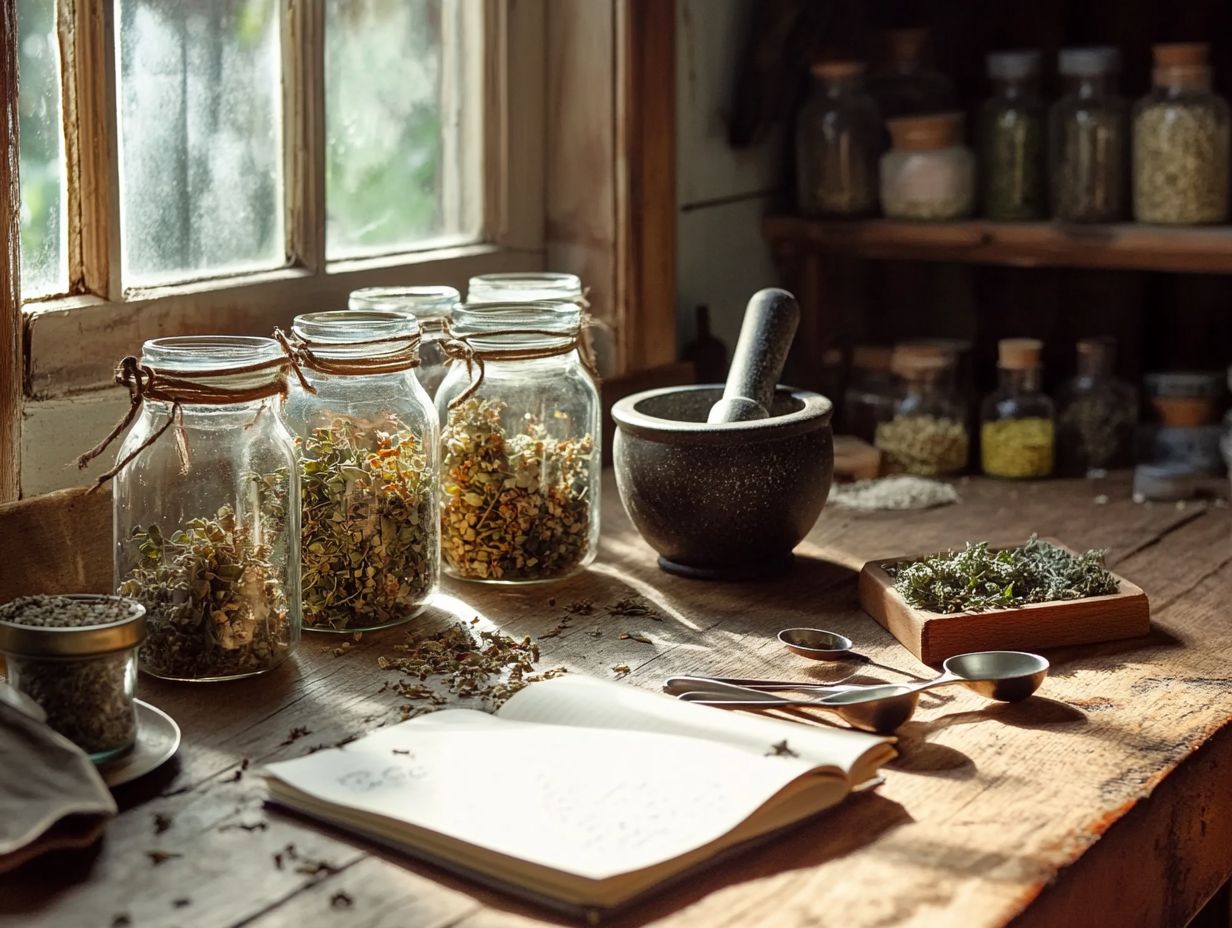
Steering clear of common pitfalls in herbal dosing, such as overdosing and underdosing, is essential for safeguarding consumer safety and attaining the desired health benefits.
Your attention to these critical details will enhance the effectiveness of the herbs and contribute to a more satisfying and secure experience.
Don’t miss out on a safe experience mitigate safety concerns by following best practices!
Overdosing and Underdosing
Overdosing or underdosing herbal remedies can raise serious safety concerns and diminish their effectiveness. It s crucial to recognize that the balance of active ingredients in these natural products can fluctuate significantly and impact their therapeutic outcomes.
Exceeding recommended dosages can lead to toxic effects, potential organ damage, or unexpected interactions with other medications. On the other hand, underdosing might leave you with insufficient therapeutic benefits, prolonging or exacerbating health conditions.
Therefore, accurately measuring and administering herbal remedies is essential. This ensures that these alternatives work as intended while minimizing adverse effects, ultimately supporting your well-being.
Interactions with Medications
Understanding how herbal remedies interact with medications is vital for avoiding adverse effects and ensuring safety in your treatment regimen.
As herbal remedies grow in popularity, it s increasingly important to recognize how these natural substances, including various herbal supplements, might interact with both prescription medications and over-the-counter products. Many people assume that because a product is labeled as natural, it poses no potential complications. However, this assumption can lead to harmful consequences, including adverse reactions from herbal remedies.
Consulting with your healthcare provider is essential when considering any herbal supplements. This conversation helps identify possible interactions and protects you from negative effects. By proactively addressing these interactions, you can support your overall health and maximize the benefits of your treatment plan.
Trial and Error Approach
A trial and error approach to herbal dosing can lead to less-than-ideal treatment outcomes if not executed with care. While this method is often critical in personalized herbal therapy, it requires systematic adjustments and vigilant monitoring to truly optimize results.
You and your practitioner must stay attuned to how specific dosages and other health conditions affect your symptoms and overall well-being. This attention can steer you toward more effective dosing strategies tailored to your unique situation.
Without meticulous observation and a structured approach, you risk overshadowing the potential benefits of herbal remedies with ineffectiveness or adverse reactions.
Therefore, establishing a documented process and maintaining readiness to adapt based on feedback is essential for achieving the therapeutic outcomes you desire.
Adjusting for Individual Factors
Adjusting herbal dosing based on individual factors like age, health conditions, and personal preferences is essential for maximizing the benefits of herbal therapy. This nuanced approach recognizes that your unique body chemistry and lifestyle can significantly influence how you respond to herbal treatments.
For example, an older adult with pre-existing health issues may process herbal compounds differently than a younger, healthier individual. Your lifestyle choices such as diet, stress levels, and physical activity also play a crucial role in determining the most effective dosage based on active ingredients in herbal preparations.
Customize your herbal doses to fit your unique needs. This not only boosts effectiveness but also minimizes risks. A holistic approach looks at the whole person, including lifestyle and health, promoting a safer and more effective natural health regimen for you.
Frequently Asked Questions

What is herbal dosing and why is it important for efficacy?
Herbal dosing refers to the amount and frequency of herbal remedies taken to achieve the desired therapeutic effect. It is crucial because taking too little or too much of an herb can reduce its effectiveness or cause potential side effects.
How can you dose herbs safely and effectively?
The best practices include consulting with a qualified herbalist trained in traditional Chinese medicine and Ayurveda or a healthcare provider, starting with a low dose and gradually increasing, following recommended dosage instructions, and monitoring for any adverse reactions.
Can herbal dosing vary based on individual factors?
Yes, herbal dosing can vary based on individual factors such as age, weight, medical conditions, and current medications. It s vital to consider these factors when determining the appropriate herbal dose.
Is there a maximum recommended dose for herbal remedies?
Yes, there is a maximum recommended dose for herbal remedies. It is important to follow dosage instructions and not exceed the recommended amount, as high doses can be toxic and cause harm to the body.
How should herbal dosing be adjusted for children and elderly individuals?
Children and elderly individuals may require lower doses of herbal remedies due to their smaller size or potential sensitivity. Consulting a qualified healthcare provider for specific dosing recommendations for these populations is best.
Is there a risk of overdose with herbal remedies?
Yes, there is a risk of overdose if the recommended dose is exceeded. It is crucial to carefully follow dosage instructions and avoid combining multiple herbal remedies without consulting a healthcare provider.

